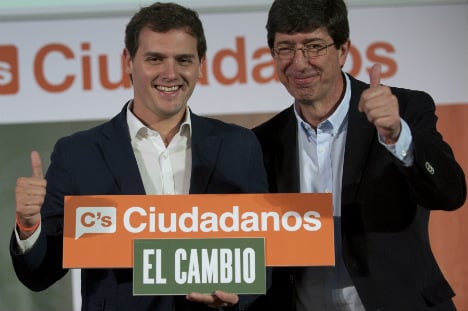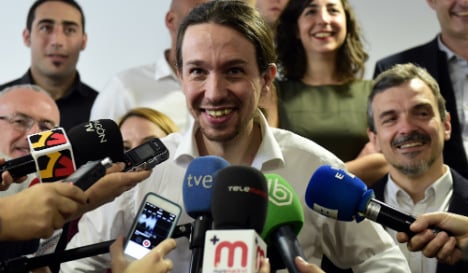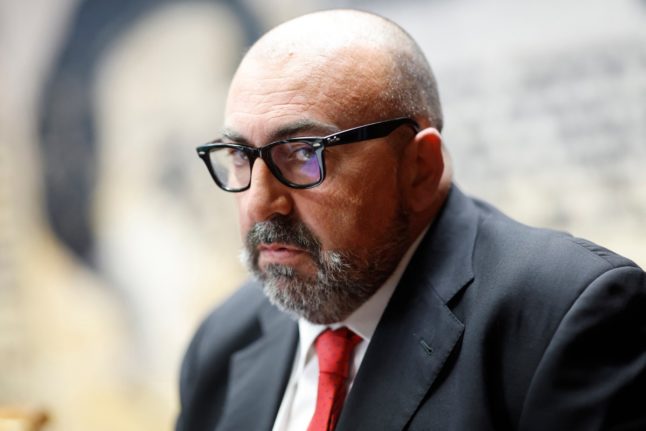Spain's new party Ciudadanos and its promise of "reasonable change" has shuffled the cards in an election year following the emergence of the more radical Podemos by attracting the most sought-after voters — those of the centre.
With the campaign for May 24 municipal and regional elections officially underway on Friday, Ciudadanos supporters were set to start putting up posters in Madrid and other cities at the stroke of midnight.
The party has climbed to third place with 19.4 percent support, ahead of Podemos and just behind the ruling conservative Popular Party and the Socialists, according to a poll published by Cadena Ser at the end of April. Podemos, which once topped polls, came in fourth.
Analysts predict Ciudadanos, headed by 35-year-old lawyer Albert Rivera, will play the role of kingmaker following a year-end general election if neither the Popular Party or the Socialists, who have alternated power since 1982, obtain an absolute majority.

Ciudadanos was founded in 2006 as an anti-independence party in Spain's wealthy northeastern Catalonia region but expanded nationwide this year as it has tapped into voter frustration with established parties.
The party, which picked up two seats in the European parliament last year, is fielding candidates in over 1,000 of Spain's 8,000 municipalities and in all 13 regions which are voting on May 24.
"We are a threat for corrupt politicians and those who do not want anything to change," says Rivera.
"There is no need to shout, insult and blame others for all of the nation's ills," he adds, alluding to Podemos and its frequent condemnation of "the caste", Spain's political and business elite.
"It is time to take action and make proposals," Rivera says.
Ciudadanos, which means "Citizens", has already presented a detailed party programme with estimated costs for its proposals.
Rajoy 'out of touch'
The party, which had less than 10 percent voter support as recently as December, says over 100,000 voters have signed up as sympathisers, many from Prime Minister Mariano Rajoy's Popular Party.
Nearly one in three, 28.9 percent, of voters who cast their ballot for the Popular Party during the last general election in 2011 feel Ciudadanos is now closer to their political views, according to polling firm MyWord.
Antonio Quilis, who is in charge of communications for the Ciudadanos candidate for mayor in the northern city of San Sebastian, says he was drawn to the party due to its tough stance against corruption and because Rajoy is "out of touch" with Spaniards' everyday problems.
"Over the past three years my income has dropped by 40 percent," said Quilis, a 47-year-old single father who has two children.
He said he voted for Ciudadanos for the first time during the European parliament elections last year after long supporting the Popular Party and then briefly supporting the tiny anti-corruption UPyD party.
The party has recently started to attract left-wing voters, including those of Podemos, after initially growing at the expense of the Popular Party. It rejects the right-wing label.
"We are a progressive and liberal party" which is close to social democracy, the deputy leader of Ciudadanos, Matias Alonso, told AFP.
Ciudadanos has filled the void left by the Popular Party among young voters, according to Belen Barreiro, a sociologist who heads the MyWord polling firm.
The Popular Party does not get more than five percent support among voters aged 18-24, she said.
Ciudadanos is its "digital version", closer to the information society and social networks, said Barreiro.
The Popular Party, which groups Spain's far-right, the right and the centre, is still seen "very much to the right" by eight in ten voters, she said.
"Ciudadanos is much closer to the average Spaniard", to the centre-left, she added.
Support for Ciudadanos, as well as for Podemos, remains "volatile" since they attract people of diverse backgrounds, said Ignacio Urquizu, a sociology professor at Madrid's Complutense University.
This raises the risk that if the party forms alliances after the general election, it will disappoint part of its supporters, he added.



 Please whitelist us to continue reading.
Please whitelist us to continue reading.
Member comments